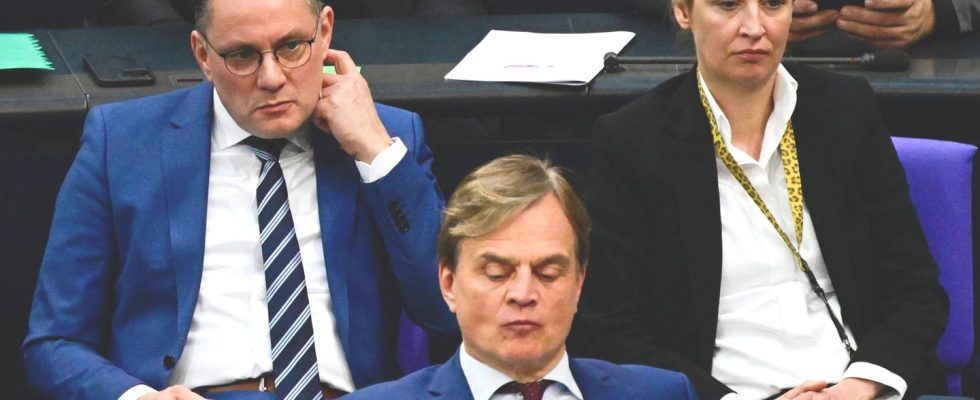Exclusive
Right wing party
Survey: Majority of German executives think possible AfD government would be bad for the economy
According to a survey, a majority of German executives believe the AfD is bad for the economy
© JOHN MACDOUGALL / AFP
There is great agreement among Germany’s leaders: AfD participation in government would be bad for the economy. According to a survey, most decision-makers reject a party ban process.
By Florent Gallet
The AfD is under pressure. Executives from German companies and public institutions are also alarmed by the party’s rise in the polls. Just like hundreds of thousands of people who took to the streets across Germany after the revelations by the media company “Correctiv” about a secret meeting of right-wing extremists, AfD and CDU politicians as well as members of the ultra-conservative Values Union. The debate about banning parties is in full swing.
The market research institute Reader Analysis Decision Makers (LAE) wanted to know how German executives assess the AfD. The pollsters surveyed 1,102 people Decision makers from business and administration. The survey results agree star exclusively. 72 percent think that the AfD’s participation in government at state level would harm economic development. Five percent expect the opposite: from their point of view, AfD participation in government would be good for the economy. State elections will take place in Saxony, Thuringia and Brandenburg in September. The AfD is loud in all three federal states RTL/ntv trend barometer in first place. However, an AfD state government is unlikely even if the election wins, as the CDU, FDP, Greens and Left categorically rule out a coalition with the AfD.
It is unclear to many people what the AfD stands for
The executives surveyed were also asked to assess how they understand the AfD’s economic policy: Does the party rely more on government intervention or a free market? Three quarters of those surveyed could not answer this simple question. For them, there are no clear economic policy ideas in the AfD’s program. The rest are divided: 15 percent believe that an AfD government would give the market a free hand, while six percent assume that the party would rely on government intervention in this case.
In its election program, the AfD calls for a radically market-liberal economic policy. The aim is to “completely free the economy from politically induced burdens”. Nevertheless, the AfD likes to present itself as the “party of the common people”. The party expressed solidarity with the farmers’ protests and their demand to maintain the agricultural diesel subsidy – even though the AfD election program rejects state support for agriculture.
Managers are against the AfD ban debate
Even if the majority of managers surveyed view the AfD critically, the majority don’t think much of a ban. 70 percent reject a ban procedure before the Federal Constitutional Court, only 22 percent are in favor. A party ban was brought up by former Bundestag President Wolfgang Thierse, among others. He called for the examination of a corresponding procedure before the Federal Constitutional Court. Just on Thursday, Federal Council President Manuela Schwesig (SPD) accepted signatures from more than 800,000 people calling for an AfD ban to be examined. However, the legal hurdles for banning a party are high. Vice Chancellor Robert Habeck recently warned starInterview, “the damage from a failed ban procedure would be massive.”
“Correctiv” research
Resignations, distancing, dismissals: these are the consequences of the right-wing network meeting so far
After soaring in the fall, the AfD has lost significantly in nationwide polls since the publication of the “Correctiv” research on the secret meeting in Potsdam. At the meeting, the Austrian right-wing extremist Martin Sellner presented a plan for the mass deportation of people with a migration background. High-ranking AfD politicians were also among the participants, including the personal advisor to co-party leader Alice Weidel. The RTL/ntv trend barometer The party currently sees 19 percent in the Sunday question for the federal election, a loss of four percentage points since mid-December.
LAE surveyed a total of 1,102 decision-makers for the survey from January 23rd to 30th, 2024. The institute includes, among others, self-employed people with employees, senior employees with a personal monthly net income of at least 3,700 euros, and civil servants with salary level A14 and above. The results are representative for this group of people.
Sources: LAE decision-maker panel, RTL/ntv trend barometer

